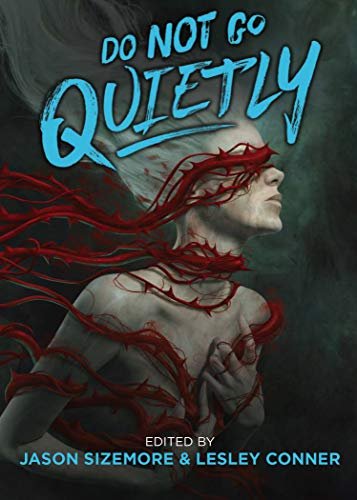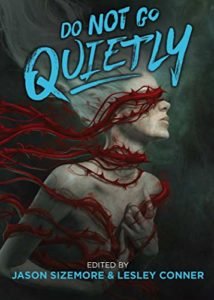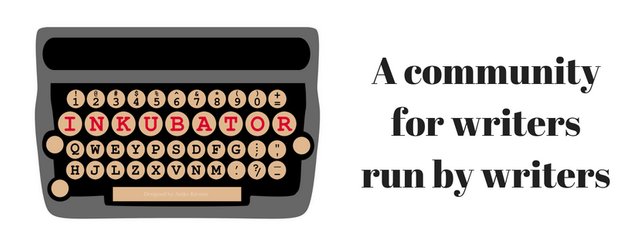Grilling Mr. Apex: A Conversation on Do Not Go Quietly, Stories, and Salted Codfish


Resistance. Revolution. Standing up and demanding to have your space, your say, your right to be. From small acts of defiance to protests that shut down cities, Do Not Go Quietly is an anthology of science fiction and fantasy short stories about those who resist. Within this anthology, we will chronicle the fight for what is just and right, and what that means: from leading revolutions to the simple act of saying “No.”
Edited by Jason Sizemore and Lesley Conner, Do Not Go Quietly was published in May of 2019 by Apex Book Company. In honour of this joyous occasion, Mr. Apex, Jason Sizemore, placed himself at the mercy of the INKubator and its minions (also known as INKlings) and kindly allowed us to interview him.
Excuse me while I swoon...
... Hang on. Still swooning...
OK I’m done now. So. As I knew they would, the INKlings chipped in enthusiastically, contributing all manner of questions. I’ll just pass the mic to Jason while I go and continue my fangirling in an unobtrusive manner.
;-)
INKlings: If a reader only takes one thing away from this anthology, beyond the pleasure of reading it, what do you hope it will be?
Jason: That they’ve been inspired to use their voice and platform in a manner that might make a difference in the world.
INKlings: Is there a particular story in “Do Not Go Quietly” that you can’t stop thinking about, one that you knew you just had to publish?
Jason: There’s this one titled “The Judith Plague” by A. Merc Rustad that I think about almost everyday. It does so much in 5000 words. Androids are coveted actors in the near future because of their uncanny way to express human emotions, yet they’re mistreated and abused. The story tackles victimization, the singularity, Hollywood shallowness, and serial killers while building a fleshed out world and incredible lead character.
A. Merc Rustad is a writer that needs to be on your radar.
INKlings: Did you have an ideal reader in mind when you put together "Do Not Go Quietly"? Or… who exactly is it for?
Jason: It’s for you, and you, and ESPECIALLY YOU!
My dad, a staunch conservative and Trump apologist, chastised me for publishing a “political” book. My response to him is that the theme of the anthology isn’t only political. And Lesley Conner (my co-editor) and I certainly did not require contributors to provide left-wing only point of views. I think readers on both sides of political and social beliefs will take something positive from each story. They’ll certain find entertainment in them.
As mentioned earlier, A. Merc Rustad’s story covers victimization. E. Catherine Tobler tackles women’s right of domain over their own bodies. Eugenia Triantafyllou takes on tyranny. Jo Miles’s contribution is a cautionary tale about media responsibility. I could list the rest, but you’ll find that each work addresses a cause that is important to the writer. You won’t find a single story trashing political beliefs, but you will find work about protagonists being heard in their unique way.
INKlings: For those of us who include Apex on our list of dream publishers, do you have any tips for us to help make our piece shine in the slush pile when you have future anthology calls? Trust me, we've several heartbroken the magazine is stopping as it was one of their "one of these days..." markets.
Jason: Aww, sorry to crush the dreams of your writer comrades. I loved finding new writers via the magazine. As an editor, there are few things better than being able to brag that you published the first pro work of a talented writer.
One connecting thread through most of the stuff accepted for Do Not Go Quietly and Apex Magazine are emotional stakes. I need a reason to care that this or that happens to your protagonist. This can be accomplished via trauma, character action, character traits, and so on. As an example I will cite Boyd Crowder played by Walter Goggins in the television series Justified. Boyd, at his core, is a rather despicable person. He’s covered in anti-semitic tattoos, has killed many people, and been a thief, crook, and liar most of his adult life. But his antagonist friendship with Marshal Raylan Givens (Timothy Olyphant) gives Boyd enough humanity and provides the viewers with character backstory to turn Boyd from pure monster to someone you root for because you know he has it in him to do the right thing.
INKlings: People always talk about the power of an opening paragraph. Is there anything, such as an interesting title, that would cause you to read on if the opening paragraph was “okay.”
Jason: So, really, this question is asking “Can a knockout title makeup for an ineffectual opening paragraph?” The answer is no. An interesting title might sell the book to the customer, but they’re going to be unhappy when they open it up and find the writing to be weak. And you certainly won’t convince any agents or editors to try your book based on a title.
INKlings: If you had to take three books to a desert island, what would they be and why?
Jason: A Hitchhiker’s Guide to the Galaxy by Douglas Adams. It’s a great book to read over and over again.
Infinite Jest by David Foster Wallace. I’ve never read it, but I hear it is difficult to finish. Being on a desert island should fix that problem.
The Girl Next Door by Jack Ketchum. To keep from going insane, I’ll need a reminder of the monsters I’ve left behind.
INKlings: How old were you when you fell in love with speculative fiction? Which story made that happen?
Jason: I was but a wee lad of 11 when I found the fantasy section in my grade school library. Of course, being from a tiny community in southeast Kentucky, the selection was slim and certainly Baptist preacher approved. The Lion, the Witch, and the Wardrobe was the first genre book I remember. I still love that book.
It wasn’t until I graduated college that I hit the hard stuff. A Game of Thrones. American Gods. Preacher. The Sparrow.
INKlings: From your own collection, which story do you regard as your best?
Jason: Quality wise, probably the best is “Yellow Warblers.” It has a strong setting and a bit of a twist that will actually catch most readers by surprise.
The most fun story to revisit is “Mr. Templar.” I love the concept of a lonely robot on an apocalyptic abandoned Earth searching for his creator (and I did write this one prior to Wall*E coming out...what a fantastic movie).
INKlings: You are forced to duel with salted codfish. Who would you rather challenge, Chuck Wendig or Neil Gaiman? And why?
Jason: I’ll take Chuck. Grab your fish, Wendig, it’s duel time!
I would never accept a duel with any Brit where a fish is the weapon of choice. They’re simply too skilled at such slapstick methods. While Neil probably grew up watching Monty Python, I was raised on a diet of Warner Brothers cartoons and The Three Stooges.
If Neil wishes to duel with finger pokes or Acme products, count me in.

On behalf of the whole INKubator community: Thank you so much, Jason, for being such a lovely guest as well as an awesome sport.
Raised in the Appalachian hills of southeastern Kentucky, Jason Sizemore is a three-time Hugo Award-nominated editor, writer, and publisher who operates the genre press Apex Publications. He is the author of a collection of dark science fiction and horror shorts titled Irredeemable and the tell-all creative nonfiction For Exposure: The Life and Times of a Small Press Publisher. He currently lives in Lexington, KY. For more information visit www.jason-sizemore.com. You can find him on Twitter as @apexjason.
Posted from our blog with SteemPress : http://inkubatorcommunity.com/grilling-mr-apex-a-conversation-on-do-not-go-quietly-stories-and-salted-codfish/
Interested in our community? Follow the link below.

I'd pay to watch a codfish battle. Sounds like something from Food Network's Chopped. I like that his first choice of desert island books is Hitchhiker's Guide.
If Sizemore actually begins a battle with Wendig, we need video!